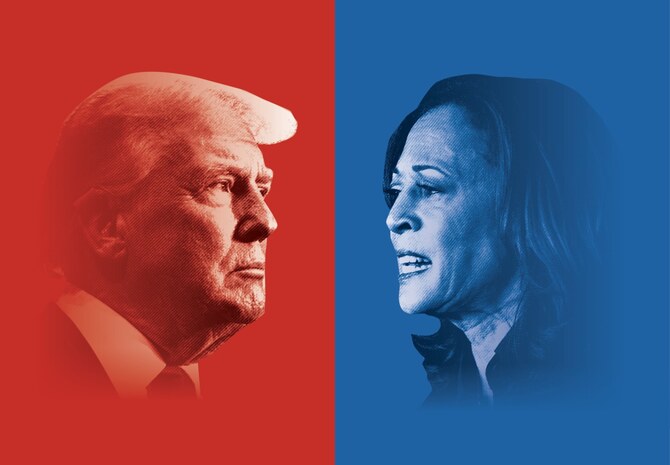LONDON: A YouGov poll of Arab Americans commissioned by the Arab News Research & Studies Unit suggests a massive Arab-American turnout for the upcoming US presidential election (87 percent), with Palestine being the top priority, and former President Donald Trump enjoying a 2 percentage point lead over Vice President Kamala Harris.
The survey of 500 Arab Americans nationwide from Sept. 26 to Oct. 1 aligns with a poll conducted in May by the Arab American Institute that showed the Democratic Party losing support among Arab Americans due to US President Joe Biden’s handling of the Gaza conflict. His support among the community hovered at just under 20 percent at the time.
During a webinar unveiling the AAI poll’s findings, its President James Zogby said Arab Americans are “still seething over the pain of Gaza … and they’re not willing to put that away.”
The battleground state of Michigan, which has a large Arab-American community, has been the focus of both Trump and Harris.
Read our full coverage here: US Elections 2024: What Arab Americans want
According to Associated Press tracking of each campaign’s public events, Trump has held 15 events in Michigan since April, while Harris will have visited the state 11 times since she became the Democratic nominee.
In a recent interview with Al Arabiya, Trump spoke of his delight at one of his grandchildren being half Arab, in reference to his daughter Tiffany marrying Lebanese Michael Boulos.
The Arab News-YouGov poll shows that despite Trump being perceived as more supportive of the Israeli government than Harris, many Arab Americans would still vote for him contrary to their identification as Democrats, which suggests that they are penalizing the Biden administration over its failure to reign in Israel’s devastating military campaigns in Gaza and Lebanon.
Opinion
This section contains relevant reference points, placed in (Opinion field)
When asked what is their top priority, most respondents chose the Israeli-Palestinian conflict over the economy or cost of living.
“The polling figures are very telling. They show that the Las Vegas rules clearly don’t apply to our region — what happens in the Middle East clearly doesn’t stay in the Middle East,” said Arab News Editor-in-Chief Faisal J. Abbas.
“While most of us here in the Arab world might be indifferent, and don’t have a say anyway, as to which candidate ends up winning, clearly Arab voters in America feel strongly about the handling of the Gaza crisis since it erupted last Oct. 7.”
The US has blocked several ceasefire motions at the UN Security Council, and has continued providing arms to Israel.
Arab Americans constitute only 1 percent of US voters, but according to Firas Maksad, a senior fellow at the Middle East Institute in Washington, their vote is significant this year because the race in so many states is so tight.
“The margin is 0.5 percent one way or the other, so that makes the Arab-American vote a crucial one, a crucial constituency to win.”



























